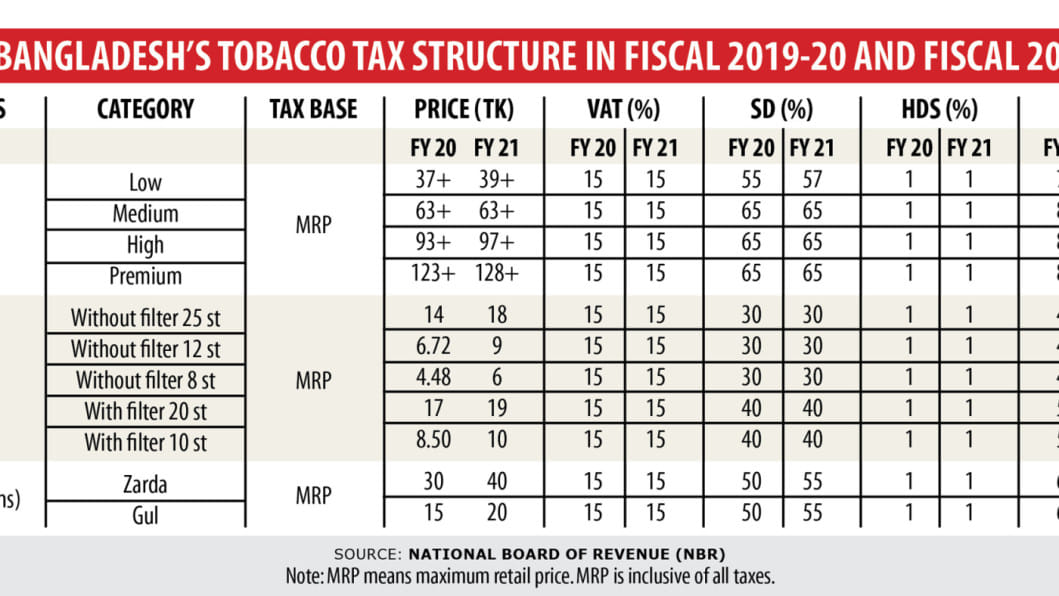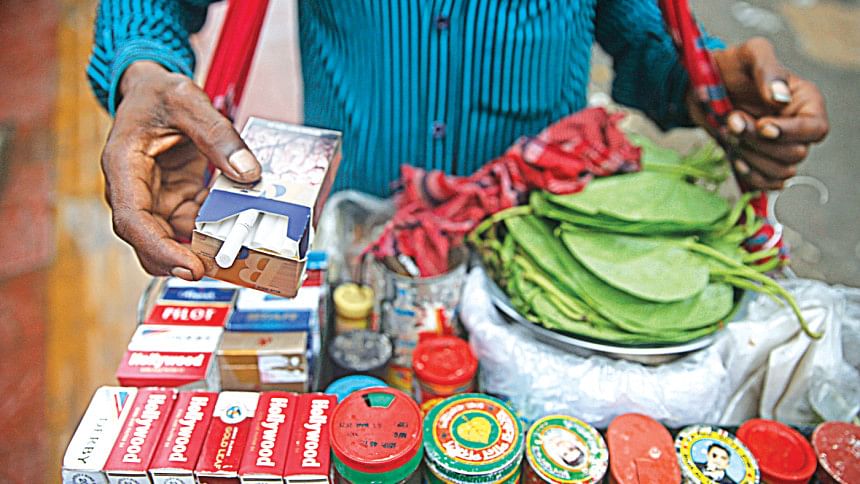What should be Bangladesh’s tobacco tax policy response to the pandemic?

Tobacco kills more than 8 million people globally every year, according to the World Health Organisation (WHO).
More than 7 million of these deaths are from direct tobacco use and about 1.2 million are due to non-smokers being exposed to second-hand smoke.
In Bangladesh, about 0.126 million people died due to tobacco-attributable diseases, which constituted 13.5 per cent of all deaths in 2018.
The economic cost of tobacco use was estimated at Tk 30,570 crore ($3.6 billion), which was about 1.4 per cent of Bangladesh's GDP in fiscal 2017-18.
Tobacco use is a known risk factor for many respiratory infections and increases the severity of respiratory diseases.
A review of studies by public health experts convened by the WHO on 29 April has found that smokers are more likely to develop severe disease with COVID-19 compared to non-smokers.
Available research also suggests that smokers are at higher risk of developing severe disease and death.
Bangladesh is one of the largest tobacco consumers in the world with 37.8 million adults aged 15 years and above -- which is about 35.3 per cent of the country's population -- consuming tobacco products, according to the Global Adult Tobacco Survey (GATS), 2017.
Although the overall prevalence of tobacco use declined by 18.5 per cent from 2009 to 2107, the consumption of cigarettes and smokeless tobacco (SLT) remains very high.
The recent response of the tobacco tax policy to the coronavirus pandemic is very disappointing.
Although the Finance Bill for fiscal 2020-21 has proposed marginal increases in the prices of the low tier of cigarette, tiers of biri and SLT, little has been proposed for increasing supplementary duty (SD).
This is reflected in the almost constant total tax incidence (TTI). This will have little impact on both tobacco consumption as well as taxes.
A tobacco tax structure matters because how tobacco taxes are structured has implication for protecting public health and enhancing government revenue.

Increases in tobacco taxes that result in significant increases in prices are highly effective in reducing tobacco use, particularly among the youth and the poor.
At the same time, increasing tobacco taxes can bring in new revenues to finance health and development efforts.
In Bangladesh, the government has developed a complex tax structure of tobacco products, which is characterised by multi-tiered ad valorem tax system, low tax base and large variations in prices and taxes within and across different tobacco products.
In Bangladesh, the differential tax treatment has led to product substitution from the medium tier to the low tier of cigarette.
The market share of the low tier is more than 67 per cent in fiscal 2019-20 while that of the medium tier is 14 per cent in the same period.
The effect of product substitution is evident from the fact that the revenue share of the low tier of cigarette is about 44 per cent in fiscal 2019-20 while that of the medium tier is 17 per cent.
The overwhelming share (more than 67 per cent) of the low tier of cigarettes in the market leads to loss of government revenue as the low-priced tier yields lower revenue (about 44 per cent in fiscal 2019-20).
National and international experts, including WHO, have suggested implementing an increase in cigarette retail prices, particularly in the lower segment, reducing cigarette tax tiers to two, unifying SD tax rates in all tax segments and incorporating a specific tax component.
These recommendations are aimed to substantially increasing revenues from tobacco and gaining associated health impacts.
To avoid the undesired and likely substitution to other tobacco products, a correlated increase in biri and smokeless tobacco taxation should also be implemented along with cigarettes.
During the current pandemic, the government would need
to protect public health and raise additional revenue to cover health costs as a consequence of the novel virus.
It also needs to fund different schemes aimed at supporting poor-income households and the economy's recovery.
It is estimated by the experts that raising tobacco taxes would: (1) encourage nearly 2 million current smokers to quit; (2) save the lives of at least 6 lakh current smokers; and (3) generate about Tk 10,000 crore additional revenue.
Bangladesh has committed to achieving tobacco-related targets under the Global Action Plan for the Prevention and Control of NCDs and the Sustainable Development Goals (SDGs).
Raising taxes on tobacco is a cost-effective way to reach those targets.
It is also a major step towards achieving the vision of a tobacco-free Bangladesh by 2040.
At the same time, tobacco tax reform will generate significant additional revenue to finance health and development priorities.
This is a clear win-win situation for the government as well as the people of Bangladesh.
The writer is a professor at the Brac Institute of Governance and Development, Brac University and former chairman of the National Board of Revenue

 For all latest news, follow The Daily Star's Google News channel.
For all latest news, follow The Daily Star's Google News channel. 



Comments